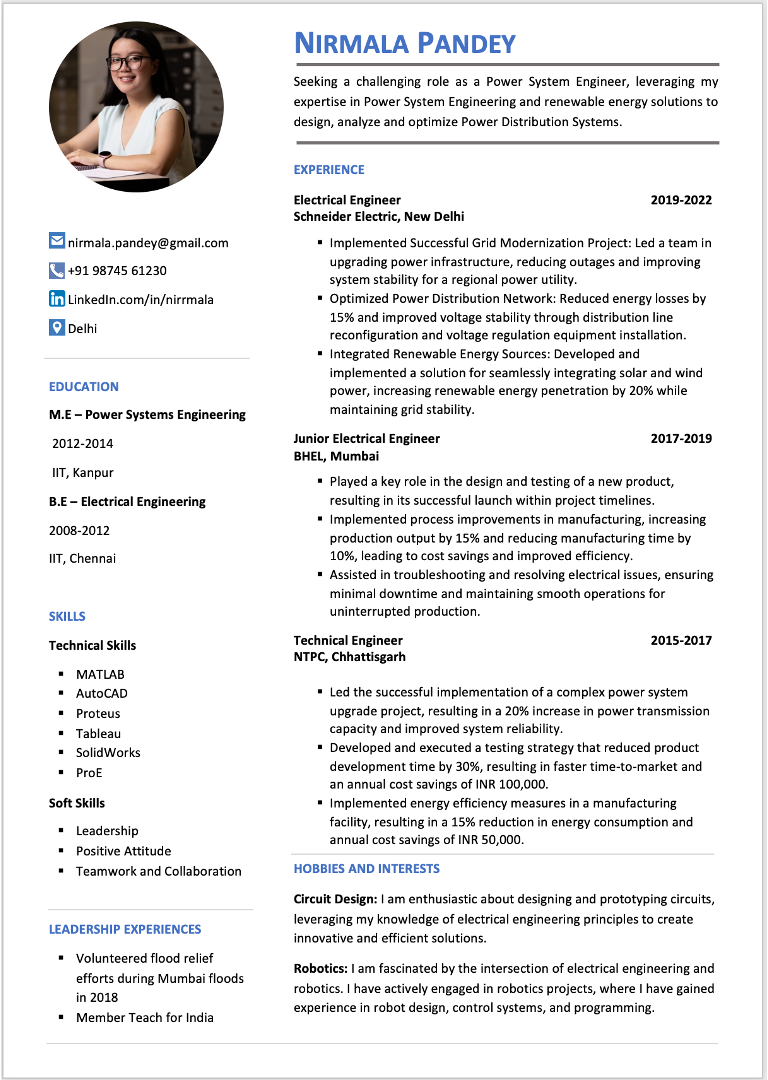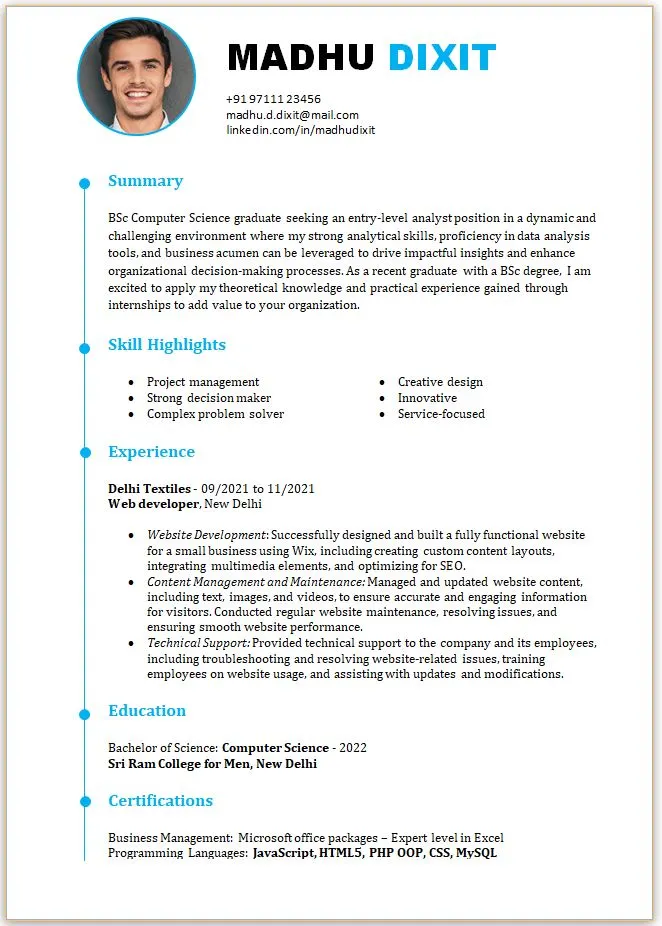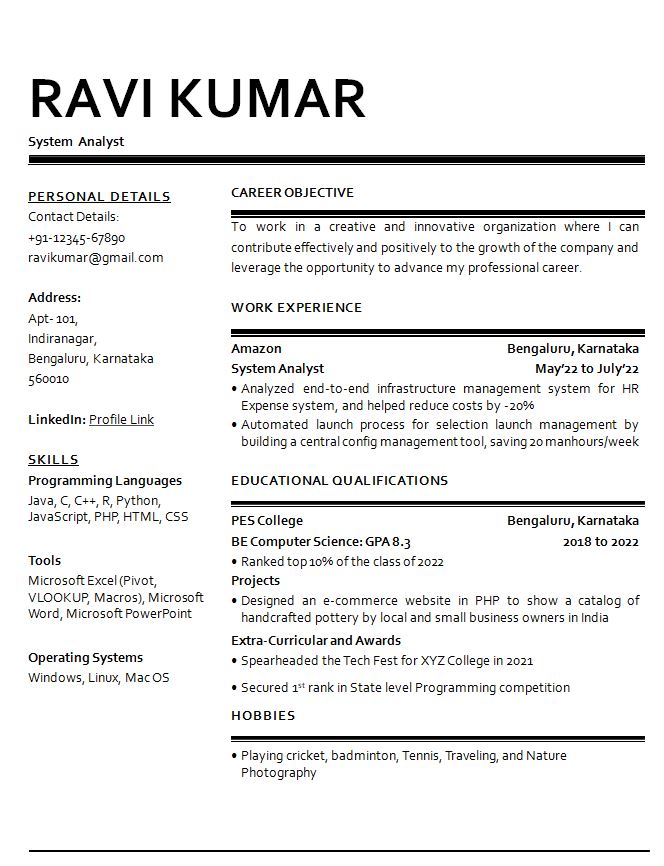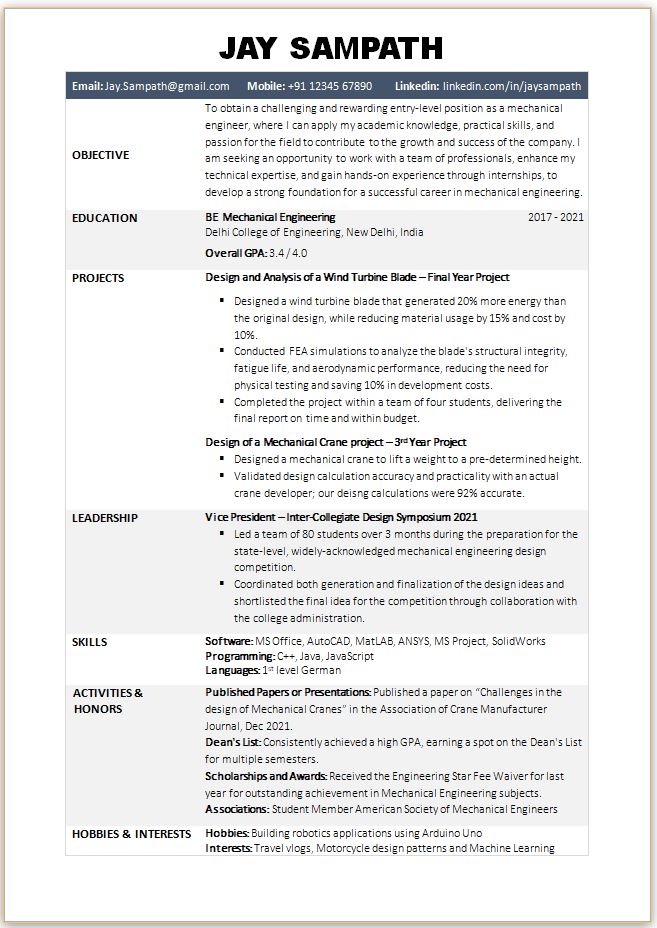Classic Resume
BE Electrical Engineer Resume
Electrical Engineer
ElecEngg


Objective
Results-driven and experienced power electronics engineer with a track record of delivering innovative solutions for efficient and reliable power conversion. Seeking a challenging role to leverage my expertise in designing and optimizing power electronic systems, contributing to the development of cutting-edge technologies that advance the field of renewable energy and electric transportation. Committed to exceeding project goals, ensuring high-quality standards, and driving continuous improvement in power electronics design and integration.
Education
BE Electrical Engineering, BTech Electrical Engineeering
Skills
When creating a skills section for a Bachelor of Engineering in Electrical (BE Electrical) resume, consider including the following skills to showcase your engineering talents:
Electrical Circuit Analysis: Proficiency in analyzing and interpreting electrical circuits, including AC/DC circuits, power systems, and electronic devices.
Power System Analysis: Knowledge of power system components, load flow analysis, fault analysis, protection systems, and power quality assessment.
Digital Electronics: Understanding of digital logic design, logic gates, flip-flops, registers, and microprocessors/microcontrollers.
Control Systems: Familiarity with control theory, feedback systems, PID controllers, and modeling of dynamic systems.
Electrical Instrumentation and Measurement: Competence in using electrical instruments for measurement, calibration, and troubleshooting, such as multimeters, oscilloscopes, and signal generators.
Power Electronics: Understanding of power electronic devices and their applications, including rectifiers, inverters, converters, and motor drives.
Programmable Logic Controllers (PLCs): Experience with PLC programming, ladder logic, and industrial automation systems.
Renewable Energy Systems: Knowledge of renewable energy technologies, such as solar power, wind power, and energy storage systems.
Circuit Design and PCB Layout: Proficiency in designing electrical circuits and creating printed circuit board (PCB) layouts using software tools like Altium, Eagle, or OrCAD.
Electrical Safety: Understanding of electrical safety protocols, including grounding, electrical codes and standards, and safe working practices.
Programming Languages: Familiarity with programming languages commonly used in electrical engineering, such as C, C++, MATLAB, or Python.
Communication and Collaboration: Strong communication skills to effectively convey technical concepts, collaborate with cross-functional teams, and present project findings.
Projects
If you are a recent graduate and do not have work experience, you can include your student project, highlighting what results you achieved from your project.
Student Project: Design and Implementation of an Automated Home Energy Monitoring System
Objective: Develop an energy monitoring system to track and optimize electricity usage in residential households.
Key Contributions:
1. Designed and assembled a low-cost energy monitoring device utilizing Arduino microcontrollers and current sensors.
2. Developed a user-friendly web-based interface to display real-time energy consumption data and historical usage trends.
3. Conducted comprehensive testing and calibration of the system to ensure accurate measurement of power usage.
4. Collaborated with a team of four students, dividing tasks and coordinating efforts to meet project milestones and deadlines.
Quantifiable Results:
1. Achieved an accuracy rate of 95% in energy consumption measurements, validated through comparison with utility meter readings.
2. Reduced overall energy consumption by 10% within the test household through increased awareness and behavior modification facilitated by the monitoring system.
3. Presented the project at a regional engineering competition, receiving second place among 15 participating teams.
Interests/Hobbies
When considering interests and hobbies to include in an electrical engineering resume, it's best to focus on activities that demonstrate relevant skills or qualities. Here are some interests and hobbies to consider:
Electronics DIY Projects: Highlighting your interest in building and experimenting with electronic circuits or devices showcases your hands-on skills and practical knowledge.
Robotics: If you have a passion for robotics, mention it on your resume. It indicates your ability to apply electrical engineering principles to the design and programming of robots.
Coding and Programming: Proficiency in coding languages like C, C++, Python, or MATLAB can be valuable for an electrical engineer. Mentioning coding as an interest shows your ability to develop software solutions and automate processes.
Renewable Energy: If you have a keen interest in renewable energy technologies, such as solar power or wind energy, it demonstrates your dedication to sustainable solutions in the electrical engineering field.
Technical Writing or Blogging: If you enjoy writing about technical subjects related to electrical engineering, such as tutorials or articles, it showcases your ability to communicate complex concepts effectively.
Home Automation: Demonstrating an interest in home automation technologies, smart homes, or IoT devices can highlight your knowledge of integrating electrical systems for improved efficiency and convenience.
Circuit Design and Prototyping: If you enjoy designing and building circuits or creating prototypes, it shows your passion for practical applications of electrical engineering concepts.
Professional Memberships: Mentioning your involvement in relevant professional organizations or engineering societies, such as the Institute of Electrical and Electronics Engineers (IEEE), demonstrates your commitment to the field and your desire for continued learning.
Remember to choose interests and hobbies that align with your genuine passions and experiences. Highlighting these hobbies can provide additional depth to your resume and demonstrate your enthusiasm for electrical engineering beyond your academic or professional endeavors.
Experience
Consider writing your work experiences as below, focusing on achievements rather than listing responsibilities.
1. Implemented Successful Grid Modernization Project: Led a team in upgrading power infrastructure, reducing outages and improving system stability for a regional power utility.
2. Optimized Power Distribution Network: Reduced energy losses by 15% and improved voltage stability through distribution line reconfiguration and voltage regulation equipment installation.
3. Integrated Renewable Energy Sources: Developed and implemented a solution for seamlessly integrating solar and wind power, increasing renewable energy penetration by 20% while maintaining grid stability.
Additional Inputs
When listing skills on a resume, it's important to avoid common mistakes that can undermine your credibility and the effectiveness of your application. Here are some common mistakes to avoid:
Listing irrelevant skills: Make sure to include skills that are directly relevant to the job you're applying for. Avoid including unrelated or outdated skills that do not align with the position.
Being too generic: Avoid using generic or vague terms to describe your skills. Instead, be specific and provide concrete examples or accomplishments that demonstrate your proficiency in those skills.
Overloading with skills: While it's important to showcase your abilities, avoid listing an excessive number of skills. Focus on the most relevant and valuable skills for the specific job, rather than overwhelming the reader with a long list.
Lack of evidence or examples: Simply listing skills without providing evidence or examples of how you have applied those skills in previous experiences can weaken their impact. Whenever possible, highlight specific achievements or projects that showcase your skillset.
Omitting soft skills: While technical skills are important for an electrical engineering resume, don't forget to include relevant soft skills as well. Effective communication, teamwork, problem-solving, and adaptability are examples of valuable skills in addition to technical competencies.
Neglecting to update skills: Ensure that the skills listed on your resume are up to date and relevant to current industry trends. Electrical engineering is a field that evolves rapidly, so it's essential to showcase your knowledge of current technologies and practices.
Not tailoring skills to the job description: Take the time to review the job description and identify the key skills and qualifications sought by the employer. Tailor your skills section to align with those specific requirements, using similar terminology and emphasizing relevant abilities.
Why this template works
This is a chronological resume template and Chronological resume templates are often considered best for experienced professionals because they emphasize a candidate's work history in a clear and straightforward manner. Here are a few reasons why chronological resume templates are advantageous for experienced professionals:
Highlighting Career Progression: Chronological resumes showcase the progression of a candidate's career, starting with the most recent position and working backward. This format allows employers to quickly assess the candidate's professional growth and see a consistent track record of employment.
Demonstrating Stability and Experience: By presenting work experience in reverse chronological order, chronological resumes emphasize continuous employment and stability. This format is particularly beneficial for professionals who have held progressively responsible roles within a specific industry or company.
Showcasing Relevant Achievements: Chronological resumes allow experienced professionals to highlight their notable achievements and contributions in previous roles. By focusing on accomplishments in each position, candidates can demonstrate their ability to make a positive impact and deliver results throughout their career.
Catering to Hiring Manager Expectations: Hiring managers are typically accustomed to reviewing resumes in chronological order, making it easier for them to quickly assess an experienced professional's qualifications and match them to job requirements. Chronological resumes align with this expectation, facilitating the hiring manager's review process.
Emphasizing Recent Relevance: The chronological format places more emphasis on recent work experience, showcasing the candidate's most up-to-date skills, knowledge, and achievements. This is especially important for experienced professionals who want to highlight their current expertise and relevance to the position they are applying for.
While chronological resumes are generally effective for experienced professionals, it's important to consider the specific requirements of the job and tailor the resume accordingly. Adapting the content and order of the sections to highlight the most relevant skills and achievements for the targeted position is crucial for maximizing the impact of a chronological resume.


